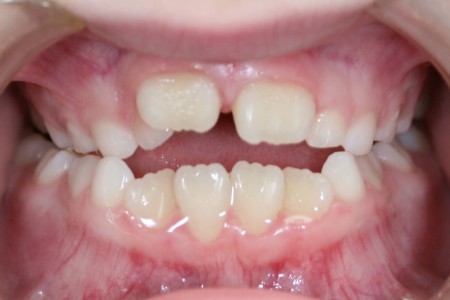A sucking habit can be extremely comforting to a child yet can cause significant dental and skeletal changes if the habit persists past a certain age. The good news is, according to the American Dental Association, most children will break the habit on their own by the ages of 2-4. Children who stop thumb sucking by the age of four often show little, if any, damage to their dentition. However, those children who continue well past the age of four, especially once the permanent incisors begin to erupt, are at risk of causing disruption that may require orthodontic correction in the future.
(This post is a sponsored post on behalf of Dobbs Orthodontics.)
How can a little thumb cause such big problems? A thumb in the mouth exerts unwanted pressures on the bones and teeth creating problems with tooth position and jaw growth. The most common affects of a persistent thumb habit are:
Protrusive upper front teeth – the upper teeth are often tipped forward. If the habit persists long enough, the upper jaw itself can be remodeled and develop in a protrusive relationship to the face.
Lower teeth tipped back – the thumb exerts forces on the lower front teeth pushing them towards the tongue.
Openbite – by preventing the upper teeth from fully erupting, the upper and lower teeth do not overlap when the back teeth are touching.
Crossbite – due to the position of the thumb and forces exerted from the cheeks during sucking, a narrowing of the palate occurs.
Although to what age the habit continues is a major factor, the degree of disruption also depends on several other factors, including how often it occurs and how forceful the habit. Even though the habit stopped at an early age, orthodontic treatment still may be needed due to damage prior to stopping the habit.
Usually, with gentle supervision, it is relatively easy to help a child quit the habit before any damage is done. For infants, it is recommended to try a pacifier. While pacifiers do not cause less damage, they are much easier to control than a thumb when it is time to phase it out. For children over five, explain the risks, provide reminders (such as a bandaid or nail polish), or even offer rewards. Negative reactions like scolding and punishments typically do not work and should be avoided.
If your child is unable to break the habit on their own or with your help, an orthodontist can fabricate an appliance to help eliminate the habit. Additionally, an orthodontist can check your child, ideally by age 7, to determine if early orthodontic treatment is needed to correct a skeletal growth problem caused by a thumb or finger habit.
We would be glad to help you give your child a healthy, beautiful smile. Call our office, Dobbs Orthodontics, 865.588.1644, to schedule an appointment.





















